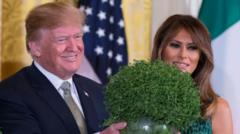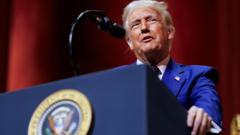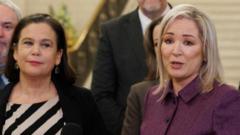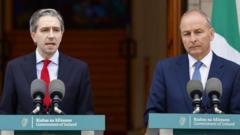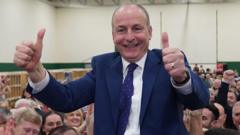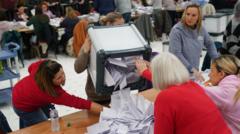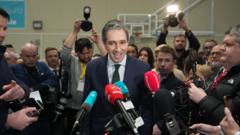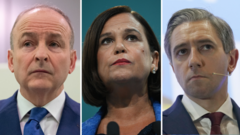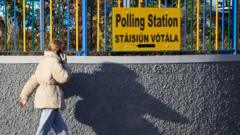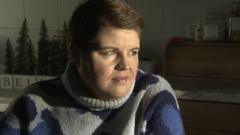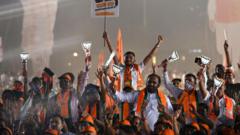The initial counts from Ireland's general election indicate a competitive struggle among the three main parties: Fianna Fáil is leading at 21.9%, closely followed by Fine Gael with 20.8% and Sinn Féin at 19%. While the turnout has dropped to 59.7%, marking a century low, the focus now shifts toward potential coalition formations as all party leaders have retained their seats.
Fianna Fáil Leads in Tight Irish General Election Race
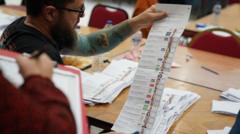
Fianna Fáil Leads in Tight Irish General Election Race
The election count reveals a tight competition among Ireland's major political parties, with Fianna Fáil projected to secure the most seats despite a historic low voter turnout.
Fianna Fáil has regained momentum in the ongoing Irish general election, leading a close three-way contest with Fine Gael and Sinn Féin. After the completion of initial counts across all 43 constituencies, Fianna Fáil is at 21.9%, closely pursued by Fine Gael at 20.8% and Sinn Féin at 19%. As of now, 95 of the 174 seats have been filled, with the vote count resuming on Sunday afternoon. This electoral cycle witnessed a turnout of 59.7%, the lowest recorded in more than a century.
The political leaders of these three major parties have successfully retained their seats in the Dáil. Micheál Martin of Fianna Fáil, Simon Harris of Fine Gael, and Sinn Féin's Mary Lou McDonald are now confronted with the challenge of forming the next government. Following the election, the former coalition government comprising Fianna Fáil, Fine Gael, and the Green Party now faces the possibility of continuing or dissolving their alliance.
Meanwhile, the Green Party's results have continuously been disappointing. Leader Roderic O'Gorman, who is set to learn of his fate later in the counting process, indicated that his party is not faring well, contrasting the results of the past elections.
Political analysts predict that Fianna Fáil and Fine Gael may necessarily aim to unite to build a government, potentially needing support from smaller parties or independent candidates to reach the threshold of 88 TDs in the Dáil for a governing majority. The results suggest that while Sinn Féin seeks to join the next administration, it must form alliances with independents and smaller parties, all of which face challenges in establishing a cohesive partnership.
In a notable outcome, independent candidate Gerry Hutch has lost a hard-fought battle for a seat in Dublin Central, despite initially leading the polls. Hutch expressed intentions to run again in future elections, highlighting an enduring political ambition. The election leaves larger questions about governance and coalition dynamics in the wake of a diminishing voter engagement, as major parties ponder negotiation strategies that could extend beyond the holiday season into the new year.
The political leaders of these three major parties have successfully retained their seats in the Dáil. Micheál Martin of Fianna Fáil, Simon Harris of Fine Gael, and Sinn Féin's Mary Lou McDonald are now confronted with the challenge of forming the next government. Following the election, the former coalition government comprising Fianna Fáil, Fine Gael, and the Green Party now faces the possibility of continuing or dissolving their alliance.
Meanwhile, the Green Party's results have continuously been disappointing. Leader Roderic O'Gorman, who is set to learn of his fate later in the counting process, indicated that his party is not faring well, contrasting the results of the past elections.
Political analysts predict that Fianna Fáil and Fine Gael may necessarily aim to unite to build a government, potentially needing support from smaller parties or independent candidates to reach the threshold of 88 TDs in the Dáil for a governing majority. The results suggest that while Sinn Féin seeks to join the next administration, it must form alliances with independents and smaller parties, all of which face challenges in establishing a cohesive partnership.
In a notable outcome, independent candidate Gerry Hutch has lost a hard-fought battle for a seat in Dublin Central, despite initially leading the polls. Hutch expressed intentions to run again in future elections, highlighting an enduring political ambition. The election leaves larger questions about governance and coalition dynamics in the wake of a diminishing voter engagement, as major parties ponder negotiation strategies that could extend beyond the holiday season into the new year.

